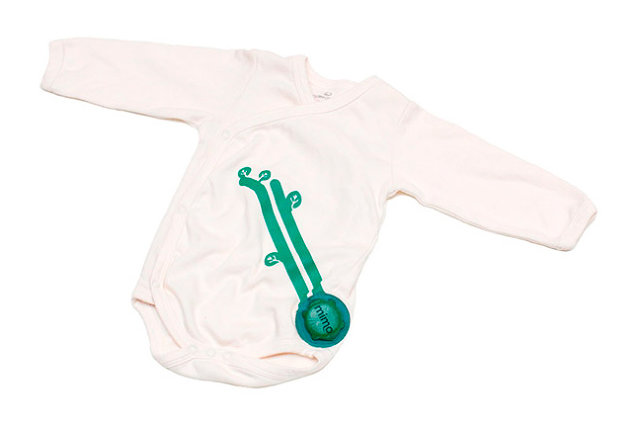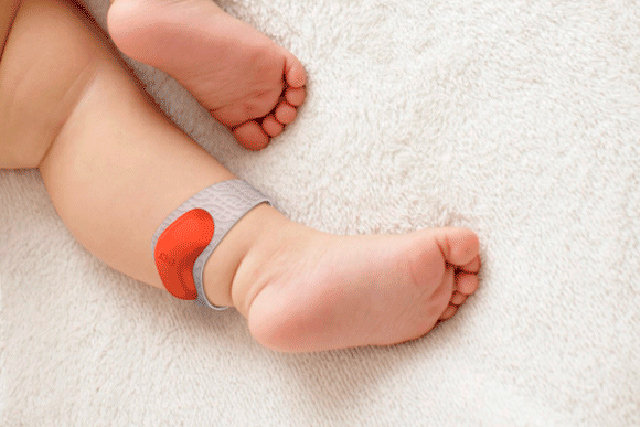- baby monitoring doesn’t seem to address anything except parental free floating anxiety
- no insights have yet been gleaned on baby (or parental) behaviour
TRACKED SINCE BIRTH: THE RISE OF EXTREME BABY MONITORING
DOES TRACKING A BABY’S EVERY MOVEMENT, CRY, AND WET DIAPER MEAN HAPPIER PARENTS AND HEALTHIER INFANTS, OR ARE WE TURNING OUR KIDS INTO TAMAGOTCHIS FOR NO REASON?
For the first 10 months of her life, her mother, Yasmin, kept detailed records of Elle’s sleep patterns, feedings, and diaper changes, noting the data points with a pencil and paper on a clipboard. A few months in, she digitized the logs, graphed the data, and became a more knowledgeable parent.
“It helped me feel confident,” she told Fast Company.
Elle wasn’t a very good sleeper, even for a baby. The pediatrician told Yasmin she needed to let her daughter “cry it out” until she fell asleep, but that never worked. For the sake of her sanity (and sleep), Yasmin took problem solving into her own hands. She wanted answers: Did she put Elle to bed too early? Too late? Give her too many naps? Parsing data, she thought, would help her figure it out. “That was the kind of stuff we were looking for,” she said.
Unfortunately for the Lucero family’s sleeping habits, Yasmin never found a definitive answer. Per the data, Elle was just fussy.
The results suggested Yasmin couldn’t engineer better naps, as she’d hoped. Just knowing that, however, made her feel better. “If you come to the conclusion that you have no control, then it’s okay to relax and just do whatever is convenient for you at the moment,” she explained. (Of course, many parents come to this conclusion at the moment of birth, without all that tedious data tracking.) But for Lucero, a conclusion–any conclusion at all–was all she wanted.
Many new and sleep-deprived parents crave that peace of mind and would kill for a data set that helped them determine if putting little Emma down an hour earlier would mean a restful night for the whole family. But unlike Yasmin, most people aren’t trained statisticians. Tired moms and dads with no mathematical background aren’t about to write down hundreds of data points, and might not know how to analyze that information anyway. Twenty-two months into Elle’s life, even Yasmin has semi-abandoned the project, and keeps much less rigorous records now.
In the imminent future, though, any curious parent with an iPhone will have access to helpful analytics, thanks to the rise of wearable gadgets for babies. Following the success of self-trackers for grown-ups, like Jawbone and Fitbit, companies likeSproutling, Owlet, and Mimo want to quantify your infants.

These devices connect to a baby via boot, anklet, or onesie, and record his or her heart rate, breathing patterns, temperature, body position, as well as the ambient conditions of the room. They aim to replace baby monitors, which give an incomplete picture of a sleeping child. There’s also the nascent “smart diaper” market, led by Pixie Scientific, which scans dirty diapers for signs of infection.
In addition to alerting parents of any concerning findings, these companies encourage a big-data approach to parenting. By gathering information on your kid’s poop, sleep, and eating schedules, the idea goes, you can engineer a happier, healthier baby. The accompanying app for the Sproutling monitor, for example, looks at patterns specific to your child and its environment to offer insights–the kind that Yasmin craved–that might help the child sleep better. It might find that little Jake naps better in complete dark, for example.

In theory, all this data will lead to more rested, relaxed parents and healthier kids. As of now, parents do a lot of this in the dark. “There’s no owner’s manual,” Sproutling CEO Chris Bruce told Fast Company. His company hopes to change that. “It’s smart technology that helps raise the parenting IQ.”
When Bruce talks about “parenting IQ,” he doesn’t just mean his customers. Sproutling and its cohorts want to use their arsenals of data to better inform research. “The promise of big data is that we can monitor every single environmental parameter and we can find correlations and detect patterns,” added Bruce, calling big data the “holy grail” of his business. Both Owlet and Sproutling indicated that they will offer up their intel–anonymously!–to researchers so that all future parents can better understand babies.
Parents like Yasmin, who haven’t had a full night of sleep in months, are desperate to have that information. She didn’t want to know average sleep patterns–information available in baby books–she wanted bell curves. Yasmin knew her baby wasn’t normal, but she didn’t know how abnormal and her own analyses couldn’t clarify that, either. “I wasn’t finding the exact data I wanted to see,” Yasmin said, after scouring the Internet for answers.
An aggregation of Yasmins, however, can provide those insights. At least that’s the hope.
What sounds like a lot of progress for parenting also means handing a digital record of your baby over to an iPhone app. Are the benefits worth that?
While these apps could improve infant health by telling a parent the exact right nap or changing time, the app in large part benefits parents. Anxious first time moms and dads who worry about every little movement (or non-movement) can monitor their children more closely than ever. “You see your baby lying there and you don’t see them moving,” Bruce, who has two young daughters, said of his experience with old-school video monitors. “You can’t see them breathing; your first thought is: ‘Oh my God, something is wrong.'”
Unlike a basic $35 baby-monitor, the $250 Owlet bootie and accompanying app can alert parents if anything serious has gone wrong, like if a kid stops breathing, or if his heart stops beating. That means no more unnecessary freakouts for the over-protective and inexperienced dad like Bruce, which leaves more time for him to do other dad things.
But, to an extent, these apps take advantage of parent anxieties. “SIDS is the number one cause of infant death. That’s really scary to parents,” Jordan Monroe, a cofounder of Owlet, told Fast Company. Monroe has no kids, but while talking to friends and friends of friends with babies, he found that to be a common worry.
Those fears don’t come from a place of reality, though. According to the Center for Disease Control, 4,000 infants die each year from Sudden Unexpected Infant Death. Only a fraction of those deaths occur because of “accidental suffocation and strangulation in bed,” according to the CDC report. And even SIDS–which causes about 2,000 deaths a year–might stem from underlying brain issues, according to recent research. Monitoring a child’s breathing with a high-tech bootie won’t cure SIDS.
As anyone who has ever had any contact with a hypochondriac knows, those facts don’t really matter. Parents will continue to worry. And, as we saw with Yasmin, certainty has a lot of value. A certain type of parent, like TechCrunch’s Leean Rao, thinks that $250 for Owlet or $200 for Mimo’s version–Sproutling hasn’t yet announced pricing–is a reasonable price to pay to worry about one less thing. In her review of Sproutling, she writes:
As a relatively new parent myself, I would have loved to be able to use some of the data from a wearable to help determine optimal sleep patterns for my child. I’m not sure if it would have helped my daughter sleep through the night earlier in her development, but to me as a fledgling parent, knowledge is power.
Of course, the dollar amount is only a part of the price parents pay with these apps. They give up their children’s data and possibly privacy. “We’re creating the largest data set of infant health data,” Monroe said–a chilling statement in certain contexts. Trackers could turn around and sell their troves to insurers or be forced to hand them over to the government. The information is also vulnerable to hackers.
These companies say they take security issues seriously. “Security encryption has been designed in our system from the get-go,” said Bruce. Anonymous sharing with researchers is both opt-in and anonymous for Sproutling users. But, even Bruce admits that our cultural acceptance of privacy changes every day. What seems innocuous today might feel invasive tomorrow (or vice versa).
Is that risk worth the stated benefits? At this point, it’s not clear these monitors offer many health solutions. The breathing and sleeping alerts will calm (and draw) a lot of parents. But, none of these companies see that as the “holy grail.” The main sell is the tracking. And what does that do for parents and babies?
Arguably, it means finding those little tweaks that make life easier. But, as Yasmin discovered, sometimes babies fuss just because. Numbers don’t always offer solutions, as technical theorist and staunch critic of the self-quantified movement Evgeny Morozov wrote in his book To Save Everything, Click Here: The Folly of Technological Solutionism. “Self-trackers gain too much respect for the numbers and forget that other ways of telling the story–and generating action out of it–are possible.”
While pediatricians typically ask new parents to chart and report feedings and bowel movements for a few weeks after bringing babies home to make sure all systems are go, obsessive tracking beyond that could get in the way of parenting, some doctors say. “Often, when babies have regained their birthweight and are 10-14 days old, I instruct families to dial the tracking down,” Dr. Wendy Sue Swanson wrote on her blog. She adds:
I want new parents to gain confidence and appreciate the homeostasis with following a baby’s natural routine. Relying only on the numbers may cause parents to miss out on the nearly unspeakable experience of parenting a new baby and all that a baby intimately communicates from the beginning. It’s better to look up at the sky to know if it’s raining than to consult the weather report on your iPhone.
After all, do you really want to treat your child like a Tamagotchi?